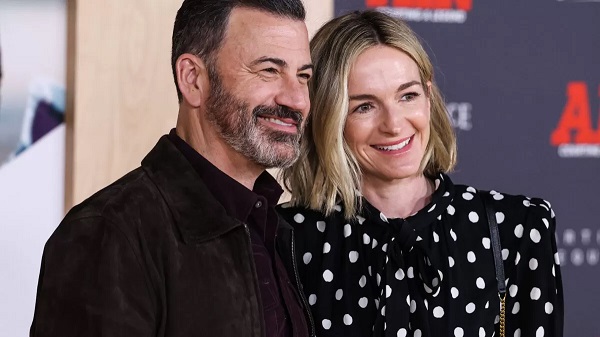Entertainment
Iconic Canadian band Northern Pikes Sunday at the Krossing

There was a time when the Northern Pikes were one of the hottest bands in the country. It was a time of Blue Rodeo and Grapes of Wrath. The Pikes are all Saskatoon lads who formed in 1984. After 4 years of relentless bars, clubs and demos, they rose to stardom across North America with the release of 1987’s Big Blue Sky. Hit singles like “Teenland”, “Things I Do For Money” and “Dancing In A Danceclub” brought the band’s music to a whole new audience as they became regulars on Much Music and MTV.
I met Jay Semko when in 1987 I moved to Saskatoon to launch a brand new TV station; what is now Global television. Personable, humble, polite, and quiet; he didn’t seem like a typical rockstar. I was already a fan of the band and meeting Jay cemented my interest. I was further hooked the moment I heard Crystal Taliefero of John Mellencamp fame wail at the 1:12 mark of the song “Girl With a Problem”. When I saw the band in concert, I was blown away by their energy and musicianship. They epitomized the hope and promise that the prairies have always held for me. They can do it. So can all of us!
The Northern Pikes have been part of musical fabric in this country for more than 3 decades. In that time, they’ve toured the world, pursued solo projects, notably Jay Semko who in the early 90’s wrote the theme song for what would become Canada’s most successful internationally syndicated TV series, “Due South”. The series was the first Canadian-made drama to debut and air on a major network in the USA (CBS-TV). More than 65 episodes were made from 1993-98.
Jay has 10 solo releases and has recorded with such music luminaries as Garth Hudson (The Band), John Sebastian (Lovin’ Spoonful), Crystal Taliefero (known for her work with John Mellencamp, Bruce Springsteen, etc), Margo Timmins (Cowboy Junkies), Melanie Doane, Ashley MacIsaac, Ken Greer (of Red Rider and the Road Hammers), Bob Egan (of Wilco and Blue Rodeo fame), Serena Ryder, Patricia Conroy, Matt Andersen and Greg Godovitz (Goddo), and worked in the studio with Grammy-winning engineers/producers/mixers Bob Clearmountain, Hugh Padgham, Ed Stasium, and Bob Ludwig.
The Pikes bring their special 30th anniversary edition of their debut album, Big Blue Sky to The Krossing. I know that I, for one, will be right there in the front soaking up some of the most iconic songs Canada produced in the late part of the last century, performed by a band with energy and enthusiasm that is surpassed only by their longevity.
Business
Will Paramount turn the tide of legacy media and entertainment?


From the Daily Caller News Foundation
The recent leadership changes at Paramount Skydance suggest that the company may finally be ready to correct course after years of ideological drift, cultural activism posing as programming, and a pattern of self-inflicted financial and reputational damage.
Nowhere was this problem more visible than at CBS News, which for years operated as one of the most partisan and combative news organizations. Let’s be honest, CBS was the worst of an already left biased industry that stopped at nothing to censor conservatives. The network seemed committed to the idea that its viewers needed to be guided, corrected, or morally shaped by its editorial decisions.
This culminated in the CBS and 60 Minutes segment with Kamala Harris that was so heavily manipulated and so structurally misleading that it triggered widespread backlash and ultimately forced Paramount to settle a $16 million dispute with Donald Trump. That was not merely a legal or contractual problem. It was an institutional failure that demonstrated the degree to which political advocacy had overtaken journalistic integrity.
Dear Readers:
As a nonprofit, we are dependent on the generosity of our readers.
Please consider making a small donation of any amount here.
Thank you!
For many longtime viewers across the political spectrum, that episode represented a clear breaking point. It became impossible to argue that CBS News was simply leaning left. It was operating with a mission orientation that prioritized shaping narratives rather than reporting truth. As a result, trust collapsed. Many of us who once had long-term professional, commercial, or intellectual ties to Paramount and CBS walked away.
David Ellison’s acquisition of Paramount marks the most consequential change to the studio’s identity in a generation. Ellison is not anchored to the old Hollywood ecosystem where cultural signaling and activist messaging were considered more important than story, audience appeal, or shareholder value.
His professional history in film and strategic business management suggests an approach grounded in commercial performance, audience trust, and brand rebuilding rather than ideological identity. That shift matters because Paramount has spent years creating content and news coverage that seemed designed to provoke or instruct viewers rather than entertain or inform them. It was an approach that drained goodwill, eroded market share, and drove entire segments of the viewing public elsewhere.
The appointment of Bari Weiss as the new chief editor of CBS News is so significant. Weiss has built her reputation on rejecting ideological conformity imposed from either side. She has consistently spoken out against antisemitism and the moral disorientation that emerges when institutions prioritize political messaging over honesty.
Her brand centers on the belief that journalism should clarify rather than obscure. During President Trump’s recent 60 Minutes interview, he praised Weiss as a “great person” and credited her with helping restore integrity and editorial seriousness inside CBS. That moment signaled something important. Paramount is no longer simply rearranging executives. It is rethinking identity.
The appointment of Makan Delrahim as Chief Legal Officer was an early indicator. Delrahim’s background at the Department of Justice, where he led antitrust enforcement, signals seriousness about governance, compliance, and restoring institutional discipline.
But the deeper and more meaningful shift is occurring at the ownership and editorial levels, where the most politically charged parts of Paramount’s portfolio may finally be shedding the habits that alienated millions of viewers.The transformation will not be immediate. Institutions develop habits, internal cultures, and incentive structures that resist correction. There will be internal opposition, particularly from staff and producers who benefited from the ideological culture that defined CBS News in recent years.
There will be critics in Hollywood who see any shift toward balance as a threat to their influence. And there will be outside voices who will insist that any move away from their preferred political posture is regression.
But genuine reform never begins with instant consensus. It begins with leadership willing to be clear about the mission.
Paramount has the opportunity to reclaim what once made it extraordinary. Not as a symbol. Not as a message distribution vehicle. But as a studio that understands that good storytelling and credible reporting are not partisan aims. They are universal aims. Entertainment succeeds when it connects with audiences rather than instructing them. Journalism succeeds when it pursues truth rather than victory.
In an era when audiences have more viewing choices than at any time in history, trust is an economic asset. Viewers are sophisticated. They recognize when they are being lectured rather than engaged. They know when editorial goals are political rather than informational. And they are willing to reward any institution that treats them with respect.
There is now reason to believe Paramount understands this. The leadership is changing. The tone is changing. The incentives are being reassessed.
It is not the final outcome. But it is a real beginning. As the great Winston Churchill once said; “Now this is not the end. It is not even the beginning of the end. But it is, perhaps, the end of the beginning”.
For the first time in a long time, the door to cultural realignment in legacy media is open. And Paramount is standing at the threshold and has the capability to become a market leader once again. If Paramount acts, the industry will follow.
Bill Flaig and Tom Carter are the Co-Founders of The American Conservatives Values ETF, Ticker Symbol ACVF traded on the New York Stock Exchange. Ticker Symbol ACVF
Learn more at www.InvestConservative.com
Censorship Industrial Complex
The FCC Should Let Jimmy Kimmel Be

|
||||||||||||||||||||||||||||||||||||||||||||||||||
|
||||||||||||||||||||||||||||||||||||||||||||||||||
|
||||||||||||||||||||||||||||||||||||||||||||||||||
|
||||||||||||||||||||||||||||||||||||||||||||||||||
|
||||||||||||||||||||||||||||||||||||||||||||||||||
|
||||||||||||||||||||||||||||||||||||||||||||||||||
|
||||||||||||||||||||||||||||||||||||||||||||||||||
|
|
||||||||||||||||||||||||||||||||||||||||||||||||||
|
||||||||||||||||||||||||||||||||||||||||||||||||||
-

 Automotive2 days ago
Automotive2 days agoThe $50 Billion Question: EVs Never Delivered What Ottawa Promised
-

 Local Business2 days ago
Local Business2 days agoRed Deer Downtown Business Association to Wind Down Operations
-

 International1 day ago
International1 day agoTrump admin wants to help Canadian woman rethink euthanasia, Glenn Beck says
-

 C2C Journal2 days ago
C2C Journal2 days agoWisdom of Our Elders: The Contempt for Memory in Canadian Indigenous Policy
-

 Alberta2 days ago
Alberta2 days agoAlberta introducing three “all-season resort areas” to provide more summer activities in Alberta’s mountain parks
-

 Agriculture2 days ago
Agriculture2 days agoGrowing Alberta’s fresh food future
-

 Alberta1 day ago
Alberta1 day agoThe case for expanding Canada’s energy exports
-

 Censorship Industrial Complex2 days ago
Censorship Industrial Complex2 days agoConservative MP calls on religious leaders to oppose Liberal plan to criminalize quoting Scripture



















